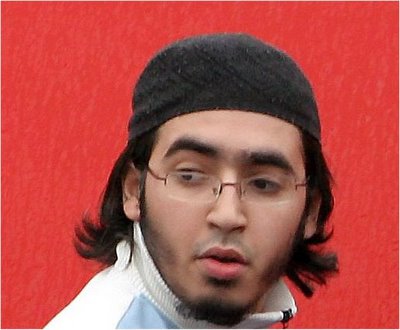The deteriorating situation in Mali and the latest incursion into Algeria has caused an increase in security in Morocco and in France. In Paris 700 troops have been deployed around sensitive areas. In Morocco a noticeable increase in security has also taken place with a visible presence of security forces on the streets. This follows an extended telephone discussion on January 14 between King Mohammed VI and the French President, Francois Hollande. According to a statement from the Royal Cabinet the two leaders assessed and exchanged views on the situation in Mali
 |
| French troops arrive in Bamako |
When the Malian President, Dioncounda Traoré, called on France for military aid in the fight against "terrorist elements", François Hollande was quick to react, announcing on Friday a commitment of troops to assist the Malian army. Since then other strategic towns such as Konna have fallen to the Islamists.
In an opionion piece in the Eurasia Review, Said Temsamani, a Moroccan political commentator, observes that Morocco has never ceased calling for a “decisive action and serious cooperation on regional and international levels ... the international community have for some time ignored Morocco’s persistent warning that sub Saharan Africa is starting to transform into a safe haven for terrorist groups. Plagued by systematic state failure, sub-Saharan Africa’s failed states have helped facilitate internationally sponsored terrorist networks and operations. Huge quantities of arms, money were smuggled into radical extremist jihadist camps. Radical movements of internationally sponsored terrorist such as al Qaeda. With the continuous abduction of European humanitarian workers in the region, it is becoming increasingly obvious that internationally sponsored terrorist networks have found a permanent home in sub-Saharan Africa and even within the hearts and minds of its people."
 |
| Police patrol the Gare du Nord station in Paris because of security concerns |
The situation escalates
According to the latest reports, French special forces were reported to be fighting house-to-house in the small town of Diabaly, north of the capital Bamako, which was captured on Monday.
The French Defence Minister, Jean-Yves Le Drian, said the town was held by 1,300 fighters from the multinational Al-Qa’ida in the Islamic Maghreb (Aqim) faction. He said they were “the toughest, the most fanatical, the best organised, the most determined and best armed” of the three, loosely allied Islamist groups which overran Mali’s vast, northern desert region last year.
For a sixth day, French warplanes and helicopters pounded the rebels, who attempted last week to break through the relatively narrow “waist” of Mali into the fertile and populous south, where 90 per cent of the population of 14.5 million lives.
Today, a column of 30 French armoured trucks and light tanks moved into holding positions protecting Niger river crossings south of Diabaly. This freed special forces units to move forward to test Islamist resistance in the town itself.
The conflict spreads to Algeria
The French military assault on Islamist extremists in Mali escalated into a potentially much broader North African conflict yesterday when armed attackers in unmarked trucks seized an internationally managed natural gas field in neighboring Algeria and took possibly as many as 41 hostages, including 13 Norwegians, seven Americans, several Japanese and British nationals. Other reports suggest that the number of hostages may only be 20. More than 300 Algerian workers were also captured but later released unharmed.
The attackers are demanding a halt of French attacks in northern Mali and the release of 100 militants being held in Algeria in exchange for the safety of kidnapped hostages. Al-Qaeda in the Islamic Maghreb (AQIM) has long been active in Algeria, though it has never attacked the country's oil and gas facilities.
.jpg) |
| The Amenas natural gas field in Algeria, where Islamist militants took hostages |
Algerian officials said at least two people, including a Briton, were killed in the assault, which began with a predawn ambush on a bus trying to ferry gas-field workers to an airport. Hundreds of Algerian security forces were sent to surround the gas-field compound, creating a tense standoff, and the country’s interior minister said there would be no negotiations.
Algeria’s official news agency said at least 20 fighters had carried out the attack and mass abduction. There were unconfirmed reports late yesterday that the security forces had tried to storm the compound and had retreated under gunfire from the hostage takers. Other reports say that the hostages have been forced to wear bomb belts.
According to Reuters, Algeria’s interior minister, Daho Ould Kablia, said that the raid was led by Mokhtar Belmokhtar, who fought Soviet forces in Afghanistan in the 1980s and recently set up his own group in the Sahara after falling out with other local Qaeda leaders.
Mr. Belmokhtar is known to French intelligence officials as “the Uncatchable” and to some locals as “Mister Marlboro” for his illicit cigarette-running business, the news agency said. His ties to Islamist extremists who seized towns across northern Mali last year are unclear.
The gas-field attack coincided with an escalation of the fight inside Mali, according to Western and Malian officials, as French ground troops, joined by soldiers of the Malian Army, engaged in combat with Islamist fighters. The officials said the French-Malian units had begun to beat back the Islamist militant advance southward from northern Mali.
Eurasia Review's Said Temsamani says "...his new reality poses significant challenge for the international community, given the region’s patchwork of failed states, where terrorists can easily hide and strive. Moroccan authorities have given threat alarm for many years and have even urged strongly neighboring countries to coordinate their efforts to fight terrorism in the region. Now France has taken the leading role to fight extremism and terrorism in that region. The international community should follow France’s suit and act quickly to put once and for all an end to the prevailing terrorist danger in Sub-Saharan Africa".
UPDATE:
At least 34 hostages and 14 Qaeda-linked Islamist kidnapers were killed on Thursday in an air strike by the Algerian armed forces, Mauritania's ANI news agency reported, citing one of the kidnappers holding captives at a desert gas field. It is not immediately possible to independently verify the information. The agency does have close contact with the group which claimed responsibility for the mass kidnapping.
ANI news has also reported seven foreign hostages are still alive, citing one of the al Qaeda-linked abductors. The agency claims a spokesman for the kidnappers said those hostages were three Belgians, two Americans, a Japanese and a Briton. No details were given for the Algerians who were also captured.
A local source has told reporters that six hostages were killed when a vehicle was fired upon by the military.
SHARE THIS!







